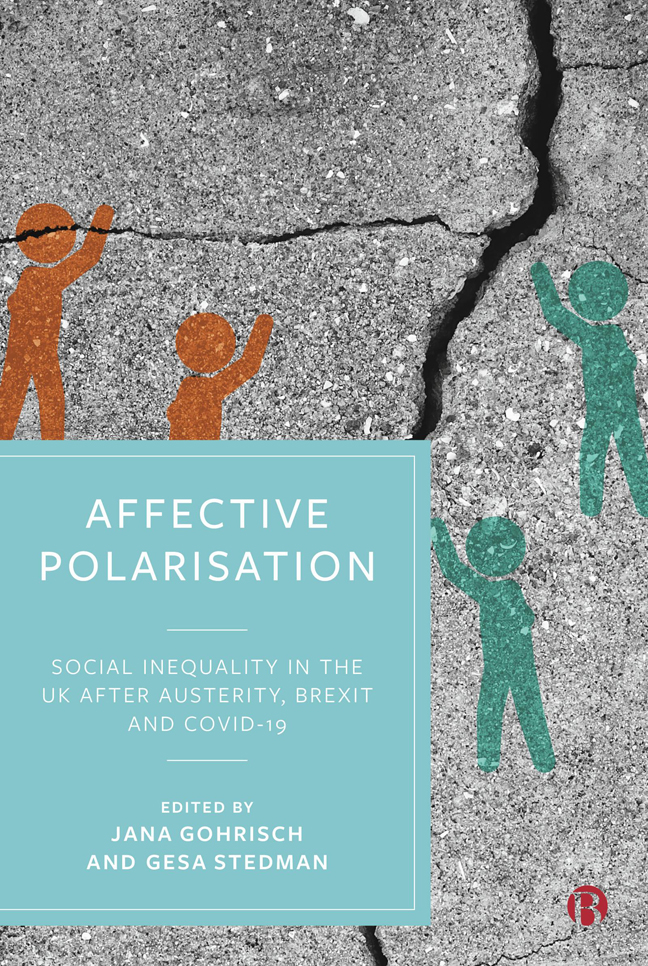Book contents
- Frontmatter
- Contents
- List of Figures, Tables and Boxes
- Notes on Contributors
- Acknowledgements
- Introduction
- 1 The Divided Left in the UK: Partisanship, Ideology and Class after Brexit
- 2 Populism and the People: Elitism, Authoritarianism and Libertarianism
- 3 ‘Coloring the Utterance with Some Kind of Perceivable Affect’: Constructing ‘Country’ and ‘People’ in Speeches by Theresa May and Boris Johnson – A Linguistic Perspective
- 4 The Challenges of Polarisation: Lessons for (Re-)Politicising Inequality across Four English Towns
- 5 “Go Away, But Don't Leave Us”: Affective Polarisation and the Precarisation of Romanian Essential Workers in the UK
- 6 Racialised Affective Polarisation in the UK
- 7 “Now You Have to Listen”: A Historical Analysis of Britain’s Left-Behind Communities
- 8 Britain in a State of Emergency: Studying Ken Loach's Films I, Daniel Blake (2016) and Sorry We Missed You (2019)
- 9 Cloaking Class: Making the Working Class Visible
- 10 Class, Poverty and Inequality in Scotland: Independence and the Creation of Affective Polarisations
- 11 Language and Identity: The Taliesin Tradition
- Conclusion
- Index
Introduction
Published online by Cambridge University Press: 23 January 2024
- Frontmatter
- Contents
- List of Figures, Tables and Boxes
- Notes on Contributors
- Acknowledgements
- Introduction
- 1 The Divided Left in the UK: Partisanship, Ideology and Class after Brexit
- 2 Populism and the People: Elitism, Authoritarianism and Libertarianism
- 3 ‘Coloring the Utterance with Some Kind of Perceivable Affect’: Constructing ‘Country’ and ‘People’ in Speeches by Theresa May and Boris Johnson – A Linguistic Perspective
- 4 The Challenges of Polarisation: Lessons for (Re-)Politicising Inequality across Four English Towns
- 5 “Go Away, But Don't Leave Us”: Affective Polarisation and the Precarisation of Romanian Essential Workers in the UK
- 6 Racialised Affective Polarisation in the UK
- 7 “Now You Have to Listen”: A Historical Analysis of Britain’s Left-Behind Communities
- 8 Britain in a State of Emergency: Studying Ken Loach's Films I, Daniel Blake (2016) and Sorry We Missed You (2019)
- 9 Cloaking Class: Making the Working Class Visible
- 10 Class, Poverty and Inequality in Scotland: Independence and the Creation of Affective Polarisations
- 11 Language and Identity: The Taliesin Tradition
- Conclusion
- Index
Summary
‘We are all in this together’ was an often-heard quote throughout the early stages of the pandemic, and was still used by world leaders in 2021, albeit with slightly greater awareness of the limits of this collective conceptualisation (see, for example, Guterres, 2020, 2021; HM Government, 2020; Sturgeon, 2020). While it is true that no country has been unaffected by COVID-19, it is clear that the pandemic has hit particular people and communities much harder than others. The reasons for this are, first and foremost, social reasons: poverty, crowded or non-existing housing, unemployment, poor health – in that order, not forgetting ethnic inequalities in many cases, which are often related to all of these issues. It is a convenient myth, which turns attention away from the fundamental elements of late capitalism, namely social injustice and inequality, which have been exacerbated by the fallout from Brexit and ten years of Conservative and coalition governments’ austerity politics in Britain (see Ahmed et al, 2022).
Ethnic minority Britons are more likely to have been hit by COVID-19, as research such as that undertaken by the Runnymede Trust has shown. They attribute this not to existing co-morbidities – as these are also prevalent in the White population – but rather to social inequality, which affects many ethnic minority Britons. Social scientists involved in longitudinal studies have shown that at the beginning of the pandemic, ethnic minority workers lost their jobs to a greater extent than their White counterparts who, in contrast, had a greater chance of being furloughed. Although this has levelled out again to some extent (Crossley et al, 2021: 18–19), there is little doubt that the pandemic has further entrenched inequalities and made it more difficult for ethnic minority Britons on the lower income scale to recover from the economic fallout of the pandemic. In turn, this is likely to have knock-on effects on health (Kapadia et al, 2022), education and housing, thus increasing the key elements of inequality. Since the advent of the most recent crisis – the cost-of-living crisis as a consequence of energy provision problems and high inflation – one can imagine how these communities will be impacted for the fourth time since the financial crash of 2008 (Treloar, 2020).
- Type
- Chapter
- Information
- Affective PolarisationSocial Inequality in the UK after Austerity, Brexit and COVID-19, pp. 1 - 10Publisher: Bristol University PressPrint publication year: 2023



